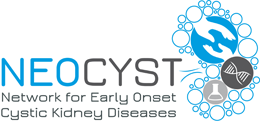Who can take part in the NEOCYST study?
All pediatric and adult patients who were diagnosed or suspected to suffer of one of the following cystic kidney disease can be recruited:
- Autosomal recessive polycystic kidney disease (ARPKD)
- Nephronophthisis (NPH)
- Nephronophthisis related ciliopathies (NPH-RC)
- Bardet Biedl Syndrome (BBS)
- HNF1ß – nephropathy (HNF1ß)
Who must be excluded from the NEOCYST study?
- Patients with autosomal dominant polycystic kidney disease (ADPKD)
- Patients with autosomal dominant interstitial kidney disease (ADIKD)
- Patients diagnosed with other hereditary non-cystic kidney diseases (Alport syndrome, tubulopathies…)
Recruitment of patients
The registration of affected patients is performed exclusively by the attending physicians or the team of the central study office. An autonomous registration of patients themselves is prohibited in order to avoid incomplete or even incorrect data samples. Patients who intend to take part in the NEOCYST project should therefore contact their physician or the central study office.
Informed consent
To register for NEOCYST a written informed consent is required. For minors both parents (or adults entitled to custody) have to sign the consent. Children aged 6 to 17 years are asked to give their own consent additionally to the one signed by their parents.
Withdrawal of consent
Any informed consent can be withdrawn by the patient and / or his parents any time without indication of a reason. In case of withdrawal of consent, all data that have been collected up to this point of time will remain in the registry in a pseudonomysed way. Further data will not be collected. All biological samples can either be destroyed or handed out to the patient.
What data are collected?
In the NEOCYST registry multiple clinical data, including the phenotypic presentation, laboratory, histological and genetic results, ultrasound findings as well as data on family history will be collected and stored in a pseudomysed way. Data collection will take place once a year as part of a routine checkup No extra appointment nor extra investigations will be needed for NEOCYST.
Biological Samples
The following biological samples will be asked for in order to enable the different are molecular investigations listed above:
- EDTA blood (1-5 ml): genetic testing via NGS and identification of modifier effects.
- Urine (100 ml): identification of disease specific marker proteins. Furthermore cell culture studies on renal cells investigating the underlying pathomechanisms and intracellular signaling pathways involved in renal cyst formations.
- Nasal respiratory epithelium: examination of ciliary function and structure by easily accessible nasal respiratory epithelium. Furthermore cell culture studies on fibroblasts in order to investigate disturbed molecular ciliary processes in affected patients.
Providing of biological samples is entirely voluntary and independent from the participating in the NEOCYST clinical registry. Every patient is asked to sign separately for the collection of clinical data and/or one or more biological samples.
Data storage and anonymization
Electronic data storage and analysis is completely pseudonymized, implying that all identifying data such as names or date of birth are replaced by a number code. Data entry is only accessible by a password controlled SSL secured internet page. All data are stored on a separate server, other than the one the data are entered ensuring the highest standards of data security to date.
All biological samples are anonymized directly after acquisition all identifying data are replaced by another number code. All samples undergo a second anonymization process, ensuring that identification by unauthorized persons is not possible. Biological samples will only be passed on for scientific investigations if a complete two-step anonymization has been completed.
